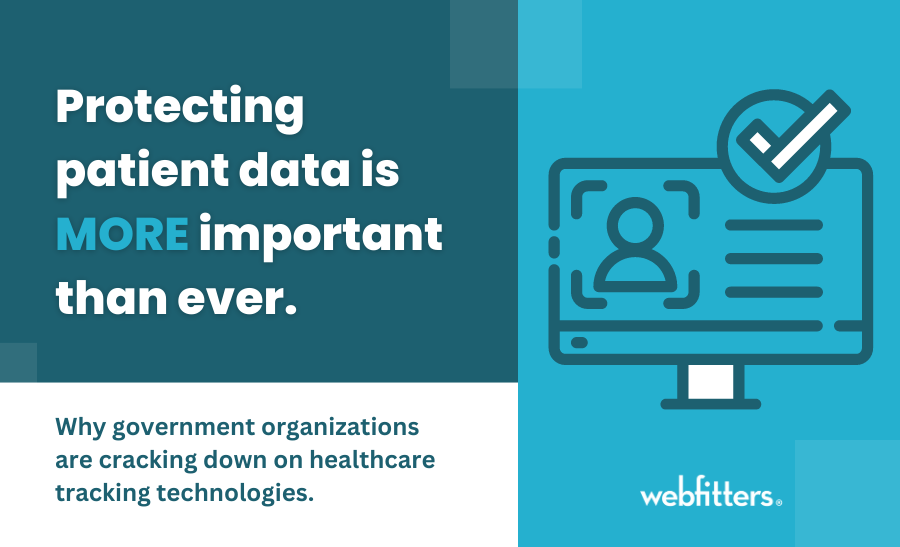Why Protecting Patient data is MORE important than ever

Many organizations, small and large, understand the importance that comes with tracking their user’s behavior on their website. This allows businesses to adapt their messaging, create targeted content and better understand how to create a more engaging online presence.
In just about every industry, analytics are seen as a beneficial tool for shaping their marketing efforts. But, in industries like healthcare, collecting data that could potentially paint a bigger picture of their users, including highly-sensitive patient information, is becoming less beneficial and more risky. And, large government organizations have started taking this very seriously.
The U.S. Department of Health and Human Services (HHS), Office for Civil Rights (OCR) and the Federal Trade Commission (FTC) has started warning healthcare providers, hospital systems and telehealth providers that tracking patient data can be a violation of their HIPAA rights.
Third-party tracking software like Google Analytics and Meta Pixel threaten to put user data at risk of breach, or disclosure to unauthorized parties. There is also the additional risk of these tools collecting sensitive data not permitted by the patient. According to the HHS website:
“The FTC has put companies on notice that they must monitor the flow of health information to third parties that use tracking technologies integrated into websites and apps. The unauthorized disclosure of such information may violate the FTC Act and could constitute a breach of security under the FTC’s Health Breach Notification Rule.”
As a hospital, healthcare system or telehealth provider, there are additional threats that can occur alongside HIPAA violations. Data breaches, protected health information (PHI) breaches, phishing scams and more can also happen through compromised tracking technology.

Data Breaches and Unauthorized Access:
If unauthorized individuals gain access to patient records, medical histories, personal identifiers, and other sensitive data, it could result in identity theft, fraud, or other malicious activities.
Cybercriminals may exploit tracking vulnerabilities to infiltrate the system and extract patient data, using it for financial gain or even to compromise patient safety. Not only is it crucial to protect your website, but any applications associated with your organization like bill payment portals or scheduling features.
Patient Confidentiality Violations:
Online tracking technologies, like Google Analytics, often collect various forms of data including browsing history, location information, and device types. If the tracking platforms are not implemented securely, there’s a risk that patient confidentiality could be compromised.
Additionally, if a hospital system, healthcare organization or telehealth provider’s website or app inadvertently leaks information about a patient’s medical conditions or treatment history, it could lead to embarrassment, discrimination, or other negative consequences.
Patients trust these systems to keep their information private, and any breach of that trust could have legal and reputational consequences for the healthcare provider.

Targeted Attacks and Phishing:
Healthcare systems, hospitals, and telehealth providers can also be exploited internally to gather information about the healthcare professionals and staff working within the clinics.
If cyber criminals gain access to that information, it could be used to launch targeted attacks, like spear phishing campaigns. They can use the collected data to craft convincing and personalized phishing emails that trick employees into clicking on malicious links or providing sensitive information.
These attacks could lead to the compromise of login credentials, unauthorized access to systems, and potentially even the deployment of ransomware or other forms of malware.
What can hospital systems, healthcare clinics and telehealth providers do?
It’s essential to protect your patient’s data and the personal information of your staff. Ensuring you have proper security in place and taking advanced measures to abide by HIPAA regulations will allow you to be prepared for anything.
Here are some measures your healthcare organization can take to secure your PHI.
Strong Cybersecurity Practices: Implement robust cybersecurity measures, including regular security assessments, vulnerability management, and penetration testing to identify and address potential weaknesses.
Data Encryption: Ensure that all sensitive patient data is encrypted both during transmission and while stored on servers. This helps protect patient information from unauthorized access.
Privacy by Design: Incorporate privacy and security considerations into the design and development of online platforms from the outset. Minimize the collection of unnecessary data and implement strict access controls.

Employee Training: Provide thorough training to healthcare professionals and staff on cybersecurity best practices, including how to identify phishing attempts and other social engineering tactics.
Regular Updates: Keep all software and systems up to date with the latest security patches to minimize vulnerabilities that could be exploited by attackers.
Third-Party Vendor Due Diligence: If utilizing third-party tracking technologies or services, thoroughly vet their privacy and security practices to ensure they align with your organization’s standards.
Incident Response Plan: Develop and regularly update an incident response plan to address potential breaches. This plan should outline steps to contain and mitigate the effects of a breach if it occurs.
By implementing these proactive security measures, hospitals, healthcare systems and telehealth providers can significantly reduce the risks associated with online tracking and better protect patient privacy and security.
Security is a fundamental piece of every website we build. If you’re looking to update your website to adhere to HIPPA regulations, secure the PHI you have access to, and deepen trust with your patients, contact our team today.
